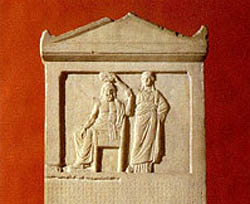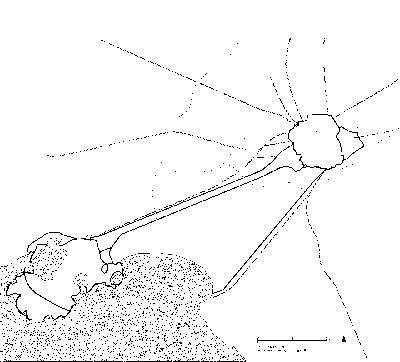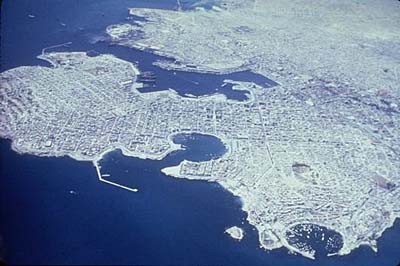Intermediate Readings
Intermediate Greek Readings
Athenian Men & Women | Plato | Democracy
In general, these passages assume that you have completed all the basic grammar, but occasionally they use a form you may not be familiar with. Don't panic. Keep your wits and make an educated guess. Then go on.
If you want to review some endings before tackling the passages, visit Smythe's Greek Grammar. Feel free to skip over the explanations to find what you are looking for. If you are looking for help with Greek syntax (e.g., the meaning of the cases), click on Rydberg-Cox, Overview of Greek Syntax
To read these texts, you will need a Greek font. Click here for Perseus' Greek Font Display Help to decide which font works best for your computer.
Men and Women in Athens



Man and Woman at a Tomb, Berlin V.I. 3262
Introduction to Lysias' life and works
Trial and Court Procedure during the time of Lysias
Lysias, On the Murder of Eratosthenes (selections)
"I will prove that Eratosthenes raped my wife." Lysias 1.4-6
"In the beginning my wife was the best of all women." Lysias 1.7-10
"Time passed and I came home unexpectedly from the country," Lysias 1.11-14
"After this, a certain old woman approached me," Lysias 1.15-17
"Returning home, I ordered the serving girl to follow me to the market," Lysias 1.18-22
"I had a friend and relative named Sostratos," Lysias 1.23-26
Plato's Dialogues

Portrait of Socrates, Louvre MA 59
Introduction to Plato's life and works
The Death of Socrates, excerpts from Plato's Phaedo
"Were you present with Socrates on the day when he drank the poison?" Phaedo 57a-b
"Did you not hear about the trial and how it happened?" Phaedo 58a-b
"The beginning of the mission is when the priest of Apollo wreathes the stern of the ship," Phaedo 58c-d
"On the previous days, I and the others had been accustomed to visit Socrates," Phaedo 59d-e
"We [went in and] caught Socrates just released from his bonds," Phaedo 60a-b
After Socrates rubs his leg and comments on pleasure and pain, he and his friends discuss at length the subject of immortality. At the conclusion of the dialogue, Crito asks Socrates, "In what way are we to bury you?" Phaedo 115c2-e
"Having said these things, he stood up [and went] into a room in order to bathe," Phaedo 116a2-b
"[A servant of the eleven came and stood] beside him and said,"I shall not blame you," Phaedo 116c-d
"And Crito said, 'But I think, Socrates, that the sun is still upon the mountains and has not yet set,'" Phaedo 116e-117a3
"Crito nodded to the boy standing nearby," Phaedo 117a4-b
"'I understand,' said Socrates, 'but it is possible and necessary for me to pray to the gods that,'" Phaedo 117c-e2
"Hearing these things, we were ashamed and held back our crying," Phaedo 117e3-end
The Perfect Polis: Women in Plato's Republic
After speaking about the ideal city, Socrates is interrupted by Glaucon, Polemon, and Adeimantus to comment on the role of women. When the passage begins, Socrates is speaking to Glaucon.
"We undertook to establish [these] men in our discourse as guardians of the flock," Republic 451c (last sentence) - 451e
"Music and gymnastic was given to them (the men)," Republic 452a-b
"If a difference appears in respect to a skill or any other pursuit in respect to the race of men and women then we will say that it is necessary to give this to each [equally]," Republic 454d (last par.) - 454e
"You speak the truth, he said, that one race excels the other in all things, so to speak, but," Republic 455d-e
"Therefore women such as these [women fit to be a guardian] must be chosen to live and guard together with men of the same sort," Republic 456b-c
"The institution which we have set up for the state is not only possible, but also the best (457a)," Socrates says. "We might say that we have escaped one wave concerning the legislation having to do with women, with the result that we have not been inundated entirely" Republic 457b (last par.) - 457d (first par.)
"I now become lazy/soft, and I desire to postpone these things [whether it is possible to have wives and children in common] and examine them later how they are possible," Republic 458b
Plato, Lysis (On Friendship)
"I was traveling from the Academy straight to the Lyceum," Plato 203a-b
"And what is this place, and what is your pastime?" Plato 204a
"I took Ktesippos [with me] into the palaistra," Plato 206e-207a4
"Among whom was Lysis, and he stood out among the boys," Plato 206e (last sentence) - 207b
"And I, looking toward Menexenus, asked him," Plato 207b (last sentence) - 207c
"After this, I was attempting to ask who was the juster and wiser of the two," Plato 207d
"Meanwhile, Menexenus came back and sat down," Plato 211a
Democracy and its Opponents

Demokratia crowning Demos, Agora Museum I 6524
You may find Xenophon less difficult than Thucydides.
The Birth of Democracy: An Exhibition Celebrating the 2500th Anniversary of Democracy
Demos: Classical Athenian Democracy
Introduction to the Athenian Legal System
The Revolution of 411 (Thucydides, Book 8 selections)
Introduction to Thucydides' life and works
Thomas Martin's historical overview of
The Oligarchic Coup of 411
"About this time and still earlier the democracy in Athens was dissolved," Thucydides 8.63.3-4
"Pisander and his allies, sailing along [the coast], abolished the democracies in the cities, as it had been decided," Thucydides 8.65
"Now this was a good-looking [pretext] for the many, since the ones who were revolting would have/control the city," Thucydides 8.66
"In this crisis, Pisander and his allies arrived and immediately clung to/applied themselves to the things left [to be done]," Thucydides 8.67
"Pisander was the one proposing this resolution and [who] in other respects most eagerly destroyed the democracy, from all appearances," Thucydides 8.68
"When the assembly, having ratified these measures with no one speaking in opposition, had been dissolved, they then introduced the 400 into the Bouleuterion (Council Chamber) in the following way," Thucydides 8.69
"When in this way the Boule (Council), speaking no word in opposition, withdrew and the other citizens did not revolt but kept quiet," Thucydides 8.70
"They also send ten men to Samos to assure the army encamped there and to explain that the oligarchy had not been set up to harm the city and its citizens," Thucydides 8.72
"For in Samos there was a revolt to the oligarchy, and such things happened to occur at about the very time that the Four Hundred were organizing," Thucydides 8.73
"The Samians and Athenians soldiers sent the ship Paralus and upon it Chaereas quickly to Athens to announce what had been done; for they did not know that the Four Hundred were in power," Thucydides 8.74
"Hearing these things, the [Athenian] soldiers [at Samos] rushed to attack/stone those promoting the oligarchy and upon those enjoying a share of the other things," Thucydides 8.75
"During this time they had come into a state of rivalry, some compelling the city to be democratic, and others compelling the army to become oligarchic," Thucydides 8.76.1-5
"Little and of no importance was the [help] by which the city was useful in overcoming the enemy, and they had lost nothing," Thucydides 8.76.6-8.77
"And the [envoys] who had been sent from the Four Hundred in order to appease and teach those at Samos arrived from Delos while Alcibiades was present," Thucydides 8.86.1-4
"And in that time then, no other [than Alcibiades] would have been sufficient to restrain the crowd, but he stopped them sailing, and turned those angry at the envoys for personal reasons from abusing [them]," Thucydides 8.86.5-9
"When the envoys sent by the Four Hundred arrived at Athens and announced the things said by Alcibiades, that he urged them to hold out and not to give in to the enemy," Thucydides 8.89
"For this reason [to protect themselves] they [the hard-core oligarchs] were eagerly building this fort [at Eetioneia near the Piraeus], which had gates and entrances and ways of bringing in the enemy," Thucydides 8.92.1-5
"But when it [the arrest of Alexicles, one of the oligarchs] was announced to the Four Hundred (they happened to be sitting together in the Bouleuterion), immediately everyone, except those who were not wishing these things to be so, was ready to rush to arms and began to threaten Theramenes and those with him," Thucydides 8.92.6-8
"And Theramenes, coming to the Piraeus (he himself was a general), became angry at the hoplites on account of the shouting," Thucydides 8.92.9-11
"On the next day, the Four Hundred, though much disturbed, nevertheless gathered in the Bouleuterion," Thucydides 8.93
The End of the Peloponnesian War and the Rule of the Thirty (Xenophon, Hellenica, Book 2 selections)
Introduction to the Life and Works of Xenophon
Thomas Martin's historical overview of
The Rule of the Thirty Tyrants
"Once the Paralus arrived at night, the disaster [at Aegospotami] was announced, and wailing from the Piraeus through the long walls arrived at the city, one person announcing the news to the next," Hellenica 2.2.3-4
The Lacedaimonians surrounded Athens: the army under the leadership of Pausanias set up camp at the Academy just outside Athens and the fleet led by Lysander anchored at Piraeus. "The Athenians, beseiged by land and sea, were at a loss what they should do since the had neither ships, allies, or grain," Hellenica 2.2.10-12
"When they [the ambassadors] were at Sellasia, near Laconia, and the ephors learned what they were proposing, being the very things they had proposed to Agis, they ordered them to go back," Hellenica 2.2.13-15
Theramenes then proposes to speak to Lysander about keeping the long walls, but he was detained three months. "When Theramenes and the other ambassadors were in Sellasia, upon being asked with what proposal they had come, they said that they had full power concerning peace," Hellenica 2.2.19-20
"Theramenes and the ambassadors with him brought back these terms to Athens," Hellenica 2.2.21-23
"The oligarchy came into being in the following way," Hellenica 2.3.2-3

Long Walls between Piraeus and Athens (Perseus)
"The Thirty had been chosen as soon as the long walls and the walls around the Piraeus were demolished," Hellenica 2.3.11-12
"When the Thirty began to consider how it might be possible to take advantage of the city for themselves however thay wished, they sent Aeschines and Aristoteles to Sparta and persuaded Lysander to come and help them with garrisons," Hellenica 2.3.13-14
"At first, Critias and Theramenes were of similar opinion and friendly," Hellenica 2.3.15-16
"When becaue of the many dying--wrongly--many were clearly gathering together and wondering what the state would become, Theramenes again spoke," Hellenica 2.3.17-19
"[Theramenes] spoke these things. But the Thirty, making a review of the Three Thousand in the agora, and of those who were not on the 'roll' here or there," Hellenica 2.3.20-21
"And they were ordering Theramenes to seize whomever he wished," Hellenica 2.3.22-23
In what continues, first Critias accuses (24-34), and then Theramenes speaks in his defense (35-49).
"When he stopped speaking these things, it was clear that the Boule was shouting approval, Critias, realizing that if he handed it over to the Boule to vote on the matter, Theremanes would escape," Hellenica 2.3.50-51
"When Theramenes heard these things, he sprang to the hearth and said," Hellenica 2.3.52-54
"When Critias had spoken these things, Satyrus dragged Theramenes from the altar, and his servants also dragged him," Hellenica 2.3.55-56
"In this way, Theramenes died," Hellenica 2.4.1

